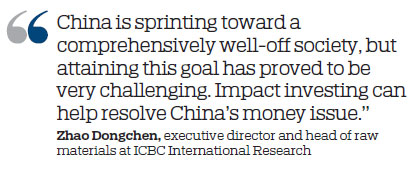A socially devoted society in the making
Updated: 2019-03-15 07:53
By Luo Weiteng in Hong Kong(HK Edition)
|
|||||||||
Asia is now seen as the world's largest market for impact investments, with the Chinese mainland leading the quest for big funding
As major developed economies lead the charge into socially responsible and purpose-driven finance, the global investment community is betting big on emerging markets like China and the entire Asian continent having their finger on the pulse of the big trend.
Impact investing is built on the notion that market-rate financial returns and positive social and environmental impacts can and should coexist.
At its core, the practice is an emerging field of asset management where environmental or social outcomes are valued as highly as financial returns.
And, the numbers speak for themselves.

According to the Global Impact Investing Network, impact investments worldwide came to $22.1 billion in 2016 - up from $8 billion four years earlier. Total investments in 2017 climbed to $25.9 billion, representing a growth rate of 17 percent.
The global market for impact investments is projected to hit $300 billion or more by 2020, says the Global Steering Group on Impact Investment.
"On a global level, we've seen a significant transition, away from impact investing being a niche, a separate thing that happens, to really embedding environmental, social and governance criteria into the everyday investment decision," said Peter Reynolds, a partner and co-head of financial services, Greater China, at global management consultancy Oliver Wyman in Hong Kong.
"But, on an Asian level, we're still a couple of years behind the trend," he said.
For sustainable investment-hungry markets like China and Asia, the potentials are always there.
"If you look at the other side of the equation, not the supply of capital but the actual projects and sustainable infrastructure that needs to be developed, Asia is, by far, the largest market in terms of its insatiable need for that type of project," said Reynolds.
Zhao Dongchen - executive director and head of raw materials at ICBC International Research - believed that impact investing offers a remedy for the pressing issues that strew thistles and thorns along China's growth journey.
"China is sprinting toward a comprehensively well-off society, but attaining this goal has proved to be very challenging," Zhao noted. "Impact investing can help resolve China's money issue."
During China's 13th Five-Year Plan (2016-20) period, the world's second-largest economy needs to lift more than 50 million rural residents out of poverty, help 100 million achieve urban resident status, provide decent housing for 100 million urbanites now living in shanty towns, and address challenges like inequality in economic and social development, a rapidly aging population, environmental pollution and ecological degradation.
To solve these problems, the country requires massive investments of money and resources. In 2015, China's total investments in fixed assets had exceeded 55 trillion yuan ($8 trillion), while the turnover in private-equity funds had surpassed 1.2 trillion yuan. "If 10 percent of these investments were used for social impact activities, it would help reduce the financing pressure on China," Zhao said.

Moreover, the Chinese mainland not only boasts the world's highest GDP growth rate, but also holds the record of the highest growth rate in the Gini coefficient in the past few decades.
"Impact investing engenders cooperation and fosters participation and investment by governments, companies, individuals and social organizations in addressing both the demand and supply sides of social challenges," Zhao reckoned. "It offers new opportunities for entrepreneurs, high-net-worth investors and environmental protection organizations."
The sheer size of the nation's population and economy renders the potentials of impact investing much greater than the proverbial drop in the ocean, but more like a small sea. Sectors including poverty alleviation, agricultural development, environmental protection, small and micro-finance economic initiatives, and health promotion, Zhao pointed out, will become the test ground and living laboratory for this nascent asset class and investment practice.
Citing the emergence of strong social enterprises and loans provided by the China Development Bank and other financial institutions for improvement projects in shanty towns and poor areas that bear social impact investment features and have played an important role in delivering social impact investment, Zhao believed China has charted its course of putting impact at the center of the investment.
When it comes to Hong Kong, impact investing has what it takes to fit in well with the cosmopolitan city's efforts to retain its crown as Asia's financial center. As the city jostles with its global counterparts for pole position in the ever-changing financial world, the SAR will have to stay relevant and play a part in the financial markets of the future. This is where impact investing could come in, Zhao noted, adding that setting up a regulatory framework is key, and expanding a specialized talent pool is also highly important.
Amid talk of how Asia should catch up with its global peers in impact investing, Reynolds said why the region is falling behind the trend should be explained first.
He highlighted a philosophical change in the last couple of years in the United States and Europe, where large asset managers like Blackrock have publicly stated that they see a real requirement for impact investing to be woven into the fabric of every decision made.
"That has essentially changed the dialogue in some of the other markets but potentially hasn't been seen in Asia yet," he noted.
"We came from a world where we used to think there was a distinct separation between the environmental social factors and financial factors, and you would have a trade-off," Reynolds reckoned.
"In markets like the US and today's Europe, those things are very much on top of each other. There's still a slight distance between those two in Asia," he added.
sophia@chinadailyhk.com
|
The Standard Chartered Wealth Management Centre in Central. While the Asian market still lags behind in impact investments, Hong Kong, as a world-renowned financial hub, is suggested to have its ducks in a row beforehand to stay relevant. Ore Huiying / Bloomberg |
(HK Edition 03/15/2019 page13)
